- Home
- Rose Tremain
Merivel: A Man of His Time Page 7
Merivel: A Man of His Time Read online
Page 7
One of the Gallants made that flicking gesture at my shoulder that I had experienced before, while another made so bold as to stoop down and take hold of my knee.
‘Messieurs,’ said I. ‘Why are you detaining me in this ungracious way? Pray tell me what is wrong.’
‘Ah,’ said one, ‘you mean you do not know?’
‘No. I’m afraid I do not know.’
‘He does not know!’ shrieked the man who had hold of my leg. ‘He must be from another land! Perhaps he is from the Moon!’
More laughter echoed round the Diamond and bounced off its thousand facets.
I held up my hands in a gesture of Surrender. ‘Pray do enlighten me,’ I said. ‘What faux pas have I committed?’
The Fops then herded me unceremoniously towards one of the Mirrors, where they positioned themselves around me. ‘We do beg you to look at yourself,’ they chorused. ‘And then look at us. Do you not see the grave enormity of which you are guilty?’
I looked at myself, as instructed. Despite my recent ablutions, I could at once see that I did not appear as a man in the very picture of health. My skin was sallow, my eyes somewhat red and my wig lacklustre, in spite of my grooming efforts. But it immediately became apparent that it was not my visage with which these Gentlemen were concerned, but rather with my Shoulders and my Knees.
With much renewal of their mirth they declared that my Shoulders were bare. (The French word they used was nues, meaning naked.) And it was only then that I noticed, on their own gorgeous apparel, great clusters of ribbons, sewn into the shoulder seam and falling in elegant cascades to their elbows. My coat had no ribbons at all. Though I had commanded it to be made by a High-Class Tailor in St James’s Street in London, before my departure from England, this excellent man had had no thought of putting ribbons where the French Fops decreed that ribbons should be. Indeed, the word ‘ribbon’ had not entered into my discourse with the Tailor at any moment.
As to my knees: I was now made aware that round the leg of every Courtier within my sight in the Galerie des Glaces, between the cutting off of the Breek and the appearance of the silk stocking, was entwined a kind of satin Ruff, apparently known as a canon. And my poor legs were again nues, with no canons anywhere, and with my knees suddenly resembling, to my smarting eyes, the knobbly, outward-turning joints of my servant Gates.
‘I am sorry,’ said one of the laughing Courtiers. ‘You are from England, judging by your vexatious accent. We do sympathise. But here in France, everybody knows that one just cannot be seen in Society, let alone at court, without canons. We strongly advise you to consult your Tailor.’
Tailor? I wanted to protest, ‘Where am I to find a Tailor in this hurly-burly, when I cannot even find adequate food to sustain the body on which my clothes must hang?’ But I only saw how pitiable this remark would make me appear in the eyes of these well-fed Gallants, so I chose, instead to say: ‘Ah! How foolish of me. Only yesterday, a pair of canons was delivered to me – of a marvellous Aquamarine colour, as it happens, to go very nicely with this Taupe coat of mine – but I forgot to put them on.’
‘Well, if I were you,’ said another, ‘I would not promenade here again until you have adjusted yourself, as to both canons and sleeve-ribbons. And Taupe, of course, is not à la mode this Season. Versailles is the Centre of the World, Monsieur “Eeenglish-man”. The King wishes us all to maintain the Honour of France, at all times, in our outward appearances – and that includes Foreigners.’
They walked away from me.
I was left alone, staring at my own inadequate reflection, which seemed to show me, in this pitiless light, every single one of my fifty-seven years and a few more besides, and yet – despite this and despite the sartorial humbling I had just received – I could still notice an obstinate Jauntiness in my demeanour which gave me some small cause for gladness.
It was then that I became aware – in the mirror – of a woman standing behind me. She held up a fan, so that I could not see all of her face, but I could nevertheless tell that she was smiling.
Before I could turn round she approached me and said, in mellifluous but accented English: ‘Forgive me, Monsieur, but I could not help but overhear what has just occurred here. People at Court are very, very rude. They feel obliged to be so, I think. They see rudeness as one of their many duties on the Road to Advancement. Please let me apologise on their behalf.’
I turned and bowed to the stranger, who wore a very becoming yet modest gown of dark-blue silk and whose age I put at perhaps forty-five. Her smile, I saw at once, was a thing of quiet beauty.
‘Thank you, Madame,’ I said. ‘It is extremely kind of you to interest yourself in my shortcomings! I will proceed to remedy them, if I can. But please let me introduce myself. My name is Sir Robert Merivel, from the County of Norfolk in the East of England.’
She dipped a little curtsey to me, her fan fluttering all the while against her cheek. ‘I am delighted to make your acquaintance, Sir Robert,’ she said. ‘I am Madame de Flamanville. My husband is a Colonel in the Regiment of Swiss Guards.’
‘Ah, the Swiss Guards! What an unforgettable impression they do create. Such discipline in the ranks. Such stoicism in the cold nights. And the way the Drums are played so delicately …’
‘Yes. I find the Drums moving, too: so many Drums to make such a hushed sound. Yet few people notice. I shall tell my husband what you said.’
I bowed again. Madame de Flamanville had now removed her fan from her face and I was struck by how clear and animated were her hazel eyes.
‘On the question of ribbons and canons …’ she said hesitantly, ‘I personally consider emphasis upon such Artefacts to be a kind of insanity. But if, on reflection, their absence from your otherwise admirable attire begins to vex you, I do know a very able Tailor in Paris who would adjust your coat and manufacture the canons, at very reasonable cost.’
‘Thank you, Madame,’ I said. ‘Thank you for your concern …’
My words faltered here, for I did not know what more to say to the offer of a Parisian Tailor. Into my mind came the desolate picture of the room I shared with Hollers and of the Pauper’s fare with which we kept ourselves alive, and I saw how far removed I had fallen – in the small space of Time in which I had been at Versailles – from the kind of normality that could include a visit to a Paris Couturier.
Perhaps my face became clouded by the onrush of these thoughts, for Madame de Flamanville approached nearer to me and laid a gentle hand upon my arm. ‘My coach goes to Paris on Wednesday,’ she said. ‘Though I am at Versailles to be beside my husband, I confess I find the Court absolutely without intellectual stimulation. You may be aware by now that nobody here talks of anything but Royal Gossip – and that, usually, as bearing on their own Preferment. So I escape to Paris, where we have a house, as often as I can. And I would be delighted to offer you a place in the coach.’
I looked into the clear hazel eyes. I tried to read what was in Madame’s mind, but her gaze was so steady that I found myself at a loss. However, the touch of her hand on my sleeve was, I now realised, so wonderfully pleasing to me that the thought of riding the eleven miles to Paris with her made me suddenly crazed with happiness. Yet, I found myself stupidly answering: ‘Oh, Madame, that is more than kind of you, but I could not possibly accept.’
At this moment there was a Stir in the room and it became clear, from everybody within it suddenly turning in the same direction, that the King had entered the Galerie. Madame de Flamanville also turned and we both saw, to my great astonishment, King Louis striding with his entourage directly towards the place where we stood.
He wore a magnificent coat of Scarlet and Gold. His wig, above the long-nosed, fleshy face, was also golden and audaciously high. His bearing was entirely that of a contained and beautiful dancer, his feet (shod in heels a little raised, to procure for him more height) turning outwards as he moved and his spine held sublimely straight.
He stopped in front of us and Madame
de Flamanville fell into a low curtsey, while I hinged myself at the waist into the kind of bow long ago perfected at Whitehall, but which I now find a little difficult to execute, my kidneys seeming to gripe at it.
‘Our dear Madame de Flamanville,’ said King Louis. ‘We are always glad to see you at Court. Madame de Maintenon is very fond of your discourse. She says she is surrounded by Ignoramuses! Please do visit her this evening at six o’clock. Bring your embroidery. As you know, she likes to stitch while she talks.’
‘I will, Sire,’ said Madame de Flamanville. ‘With great pleasure. Please tell Madame that I will much look forward to it. Meanwhile, may I present to you Sir Robert Merivel from England …’
I prepared myself to utter some suitable humble words of appreciation of the Sovereign’s willingness to cast his glance upon me, but by the time I had unhinged my body from its painful Obeisance, I saw that the King had passed on beyond me and was now engaged by the very band of Fops who had caused me my earlier distress.
Though inwardly disappointed, I wanted to reassure Madame de Flamanville that this peremptory passing on did not signify, that in my earlier concern for my wig and my clothes et cetera, I had in any case forgotten to put King Charles’s Letter into my pocket. But even as I opened my mouth, I was aware that the whole vast Galerie des Glaces had fallen silent and the only sound to be heard was the voice of King Louis, who talked in the seductive whisper of one who would always and ever be heard.
We endured this silence for a goodly while, as though Time itself had stopped, and this notion suddenly reminded me once more of the Dilemma in which Hollers found himself. I determined on the instant to try to help him and, once the King had moved out of the Galerie and Normal Time resumed, I ventured to say to Madame de Flamanville: ‘As you are going to visit Madame de Maintenon tonight, Madame, might I ask of you a small favour, on behalf of a friend?’
‘Ah,’ said Madame de Flamanville, turning away her head with a sigh, ‘Favours. In these times, here is a word I have come to dislike.’
‘Indeed …’ I stammered. ‘No, indeed. Or perhaps I mean “yes, indeed”. In any case you are quite right. Please think no more of it.’
‘The discomfort with Favours, you see,’ she said, turning back her glance in my direction, ‘is that they must almost always be repaid. If I am to do you a Favour, how are you to repay me?’
The look she gave me was defiant, yet I now detected, at the corners of her mouth, the beginnings of a smile she was endeavouring to suppress.
‘I do not know, Madame,’ said I lamely. ‘But repay you I would. Ask of me what you will. And perhaps I may permit myself to tell you that I have learned a strenuous lesson about the Keeping of my Word from His Majesty King Charles. I once broke a promise to him and the price I paid was most horribly high and of long duration. Since which time I have always tried to be honest and true in all my dealings.’
‘Have you? “Honest and True”? How extraordinary! For look around you, Sir Robert. How many ‘honest and true’ people do we see here in the Galerie, I wonder?’
My eye reluctantly quitted the gentle face of Madame de Flamanville and took in the great crowd of pomaded Courtiers and beauty-spotted Ladies scintillating in the glassy light. ‘Well,’ I said, ‘to their own Aspirations and Desires I would presume an absolute fidelity.’
The smile now broke free of its confines and Madame de Flamanville touched me provocatively on the chin with her fan. ‘I like you, Sir Robert,’ she said. ‘So now do please tell me what this Favour is. I have the ear of Madame de Maintenon and she is that rarity at Versailles, a Woman of her Word.’
I related the story of Hollers’s Clock. I did not describe the squalor in which he and I lived at present, but only mentioned his anguish at the long wait to know whether his work had found favour or no. I further said that, to my unpractised eye, the Clock was a work of great beauty and distinction, and prayed that Madame de Maintenon might find it so.
‘I understand perfectly,’ said Madame de Flamanville. ‘Let us hope that the Dutch Clock has kept time with God and that your Mr Hollers will come by the Patronage he desires. I will enquire on his behalf.’
‘Thank you, Madame,’ I said, once more executing a somewhat ridiculous bow. ‘I am most grateful.’
‘Well,’ said Madame de Flamanville, ‘gratitude is an admirable Sentiment, of course, but tiens, now that I come to think of it, I have found the perfect means of your Repayment for this favour.’
‘Tell me what it might be and I will do my best—’
‘My carriage will leave for Paris from the Places des Armes at nine o’clock on Wednesday morning. I shall expect you to be in it.’
7
THE DE FLAMANVILLES inhabited an exquisite stone mansion in Paris, known here as an hôtel, in the Faubourg Saint-Victor, very near the entrance to the Botanical Gardens (or Jardin du Roi) founded by the father of the French Monarch, King Louis XIII.
‘The house is large,’ said Madame de Flamanville, as the coach entered a circular driveway and I saw smartly clad servants standing in line to greet us, ‘so of course you will stay here, Sir Robert.’
I did not argue. One thing I had learned, on the very agreeable journey from Versailles, was that Madame de Flamanville, whose Given Name was Louise, (putting me rather deliciously in mind of the King’s mistress, ‘Fubbsy’, also Christened Louise) was a woman well used to getting her own way. From this I surmised that she may have been the child of a Doting Father (such as Margaret is) or that Colonel de Flamanville was likewise a Doting Husband, or else a weak man – or, indeed, both of these things.
But I saw, too, that Madame de Flamanville wanted her way because her mind was infinitely lively and interested itself in everything around her. Her education, mainly got in Switzerland where she was born, had been what she called ‘sufficient’, but it struck me, as the journey progressed, as having been far superior to that.
She spoke four languages, including Latin. She composed music. She knew the Scriptures ‘well enough to hold up my head in a Convent, if that Fate ever fell upon me’. Like Margaret, she was set aflame by the Geography of the world. But she told me that the thing which gave her the greatest satisfaction was the study of Medicinal Plants and their properties, and in the hôtel in the Faubourg Saint-Victor she had furnished for herself ‘a small Laboratory – with wide-opening windows in case of explosions! – in which I practise an amateurish kind of Chemistry’.
You may imagine the delight this admission gave to me. It allowed me to speak of my intimate knowledge of King Charles’s Laboratory at Whitehall and my own interest, as a physician, in Nature’s cures – even so far as to mention my departed friend, John Pearce, and his Buttercup Root Prophylactic against the Plague and the use that I made of it, which saved me from Death in 1666. And, just as I hoped, these revelations of our shared interest and our shared knowledge created a bond between us such as I declare I had never felt with any woman before.
In all the long miles to Paris, with a cold December rain making mournful the flat countryside around us, we kept up a most bracing Discourse, so that by the time we arrived, I was aware that my cheeks were fiercely overheated and my heart beating to a galloping rhythm.
In the hôtel I was shown into a large and comfortable Bedchamber with, behind a curtain, its own commodious close-stool. The sight of this object, no less than the appearance in my room of a large jug of hot water, almost brought tears of gratitude to my eyes.
The same servant who brought the water then informed me supper would be taken at seven o’clock. And this too – the delicious imaginings of a meal that did not consist of Peas and Jam – brought a constriction to my throat, so that I almost burst into one of those fits of Blubbing that so discommoded Will Gates and which had worn out innumerable handkerchiefs over the swiftly passing years.
When I had cleaned myself and chosen the Suit I would wear for supper, and washed and shaken and scolded and brushed my wig until it had miraculously resumed
something of its former liveliness and sheen, I sat down at a little Cherrywood table and began the following letter:
To: Miss Margaret Merivel,
In the Care of Sir James Prideaux, Baronet,
Mevagissey,
Cornwall
My dear Margaret,
Your Neglectful Papa sends you his fondest love and greetings, and apologises for the absence of any Letter since his arrival at Dieppe.
His sojourn at the Court of Versailles has been somewhat Difficult, owing to the great Press of People there and I have not yet had any Success in obtaining a Position among the King’s Doctors.
But fear nothing on my account. I have, of late, been very fortunate to meet some enchanting Friends, Colonel and Madame de Flamanville, and I am now arrived in Paris as their Guest.
All that I can see of the City is most Orderly and Beautiful, with, laid out at my feet as it were, the allées and parterres of the Jardin du Roi, where I hope to walk tomorrow and where, I have been told, there is a captive Bear, waiting for Transportation to the King’s Menagerie at Versailles.
So you see, I am among Wonders. The Melancholy, from which I suffered recently and which so distressed you, my dear Margaret, is, I believe, quite gone. I only wish that you were with me and that we might go together to visit the Bear, and I could hold your hand in mine.
Meanwhile, I think of you and Mary and the others taking your Scented Paths to the Sea and making for yourselves little Collections of Cowrie Shells, as sweet as babies’ fingers …
I had imagined that at supper Madame de Flamanville and I would be alone together, to continue our animated conversations, but this was not to be and I had a moment’s difficulty stifling my disappointment.
We were joined by the Colonel’s unmarried sister, Mademoiselle Corinne de Flamanville, who lived permanently in the house, under the care of her brother, and who, it transpired, did not like to move from Paris ‘owing to my great fear of becoming lost’.

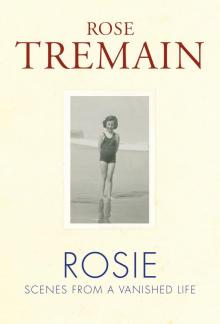 Rosie
Rosie The Garden of the Villa Mollini
The Garden of the Villa Mollini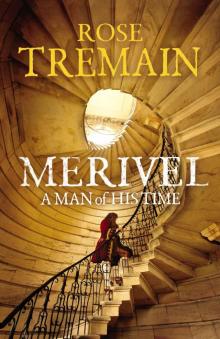 Merivel: A Man of His Time
Merivel: A Man of His Time The Darkness of Wallis Simpson
The Darkness of Wallis Simpson Earth
Earth Sacred Country
Sacred Country The Swimming Pool Season
The Swimming Pool Season The Gustav Sonata
The Gustav Sonata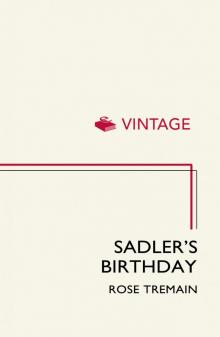 Sadler's Birthday
Sadler's Birthday The Cupboard
The Cupboard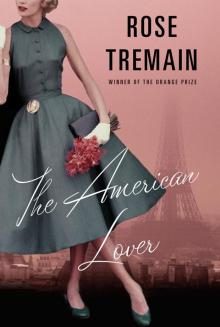 The American Lover
The American Lover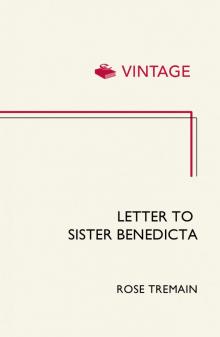 Letter to Sister Benedicta
Letter to Sister Benedicta Evangelista's Fan
Evangelista's Fan Restoration
Restoration The Road Home
The Road Home The Colonel's Daughter
The Colonel's Daughter The Way I Found Her
The Way I Found Her Music & Silence
Music & Silence